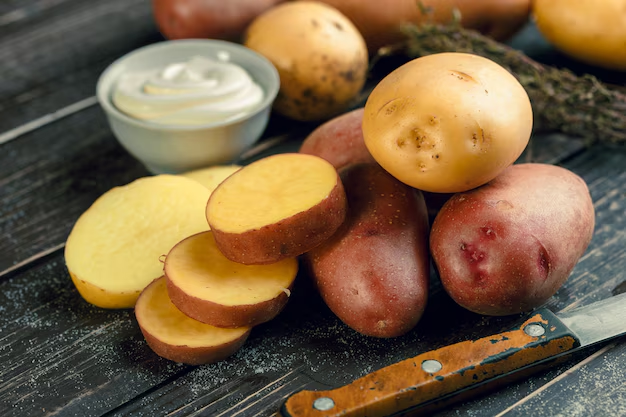Should You Store Potatoes in the Refrigerator? Here's What You Need to Know
If you've ever puzzled over whether potatoes belong in the refrigerator, you're not alone. It's a common question among home cooks and savvy shoppers aiming to keep their fresh produce in top condition. The answer isn't as straightforward as you might think, diving into food science, storage methods, and culinary impacts. Let's embark on a root-to-tip exploration of potato storage, understanding why the humble potato has specific needs and what that means for your kitchen.
The Basics of Potato Storage
Potatoes have a unique texture and flavor that's best maintained under specific storage conditions. Typically, potatoes are known for their durability, but improper storage can lead to undesirable changes.
Understanding the Ideal Conditions
Cool and Dark: Potatoes thrive in a cool, dark, and well-ventilated space. Storage at room temperature with minimal light exposure helps prevent sprouting, a common issue that depletes their quality.
Humidity Matters: A little humidity is beneficial, provided the air isn't so moist that it speeds decay. Avoid locations that are too humid, like the base of a cellar that might encourage mold.
The Refrigerator Dilemma
Refrigeration is a mixed bag [pun intended] for potatoes. Cold temperatures can convert the starch in potatoes to sugar, resulting in a sweeter flavor and potentially affecting texture during cooking. However, there are reasons one might consider refrigerating potatoes, especially in certain climates or storage scenarios.
Exploring the Impact of Refrigeration
Flavor Changes
Potatoes stored in the refrigerator often become unexpectedly sweet. This sweetness arises from the conversion of starches to sugars at lower temperatures—a phenomenon known to bakers and chefs but perhaps surprising when aiming for savory dishes.
Practical Impact: This sugar conversion can cause potatoes to burn more quickly when frying or roasting, due to caramelization. This might impact dish outcomes, making meticulously balanced flavors taste off.
Textural Adjustments
Cold storage influences the fibers in potatoes, possibly leading to grainier textures once cooked. While these changes aren't harmful, they may not deliver the creamy or fluffy results you expect from mashed or baked potatoes.
Kitchen Consequence: Consider how texture changes might affect your favorite potato dishes. For example, fries might turn overly crispy or lack the desired soft interior.
Optimal Storage Strategies
Room Temperature Solutions
Paper Bags or Burlap Sacks: These materials provide the right ventilations and block light, ideal for pantry storage. Ensure they're in a location that's not too warm, like near kitchen appliances.
Avoid Plastic Bags: Unlike porous materials, plastic traps moisture which can promote rot and germination.
Dealing with Humidity and Sprouts
Avoid Excessive Moisture: Controlling humidity can reduce the risk of rot. Use a fan or dehumidifier if necessary in particularly damp areas.
Tackle Sprouting: Sprouting is normal yet undesirable. Remove sprouts as you see them, and consider consuming these potatoes sooner than later in the rotation.
Situational Exceptions: When Refrigeration Makes Sense
In hot and humid environments, refrigeration might stabilize the condition of potatoes better than leaving them at room temperature, particularly if there's no air-conditioned space available. In such cases, be mindful of prospective flavor changes and adjust your cooking strategies accordingly.
Types of Potatoes and Their Storage Needs
Waxy vs. Starchy Varieties
Different potato types have varied storage clues:
Waxy (e.g., Red, Fingerling): These potatoes benefit from cooler, drier storage conditions more than starchy potatoes.
Starchy (e.g., Russet, Idaho): While they generally store well at room temperature, be cautious about their tendency to sweeten and soften if refrigerated.
Addressing Common Potato Storage Myths
"Refrigeration Causes Toxins"
One often hears the claim that refrigeration can lead to harmful toxins in potatoes. While cold temperatures can lead to increased sugar, which facilitates acrylamide formation when fried or baked, this doesn't translate to immediate health risks unless consumed in excessive quantities.
"Refrigerated Potatoes Must Be Thrown Away"
It's unnecessary to discard refrigerated potatoes. Use them strategically: they're suitable for mashed potatoes or soups where sweetness might be less noticeable.
Practical Takeaways
Here's a quick guide to help you navigate potato storage with ease.
🥔 Summary Tips
- Store in a Cool, Dark Place: Aim for a pantry, cellar, or cupboard overground level.
- Avoid Refrigeration When Possible: Prevent sugar build-up and texture changes.
- Use Breathable Materials: Opt for paper or burlap to keep spuds fresh and firm.
- Manage Sprouts and Rot: Remove sprouts promptly and avoid excess moisture.
Putting Knowledge Into Action
Understanding the variables that influence potato storage empowers you to care for your spuds effectively. By choosing the right storage method based on your environment and cooking preferences, you can extend the life of your potatoes and maintain their quality.
By considering the unique needs of different potato types and adjusting your methods accordingly, you can enjoy this versatile vegetable in its ideal state, meal after meal.
Whether you're cooking up a batch of crispy French fries or creamy mashed potatoes, knowing how to store potatoes properly will ensure delightful dishes. Follow the tips outlined, and your potatoes will thank you with flavor and freshness every time.

